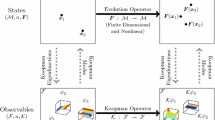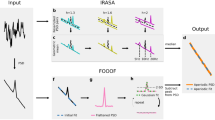Abstract
A novel instantaneous frequency-based time–frequency representation is proposed for the analysis of multicomponent signals. The concept of frequency translation is innovatively combined with the empirical mode decomposition algorithm to formulate an iterative procedure, referred to as the iterative empirical mode decomposition, to separate the components present in a signal at a suitably selected frequency resolution. The instantaneous frequency and amplitude estimated on the separated components are used to form the new time–frequency representation. The iterative empirical mode decomposition is assessed for component resolvability, and the performance of the aforementioned time–frequency representation is compared with several other time–frequency representations based on visual inspection and using objective criteria. The Hilbert spectrum formed using the iterative empirical mode decomposition not only provides high concentration of energy about the components’ instantaneous frequencies at high signal-to-noise ratio, but also good resolution while keeping the interference terms at a minimum.
Similar content being viewed by others
References
Auger, F., Flandrin, P., Gonçalvès, P., Lemoine, O.: Time frequency toolbox for Matlab. http://tftb.nongnu.org (2005). Accessed 31 July 2011
Boashash B.: Estimating and interpreting the instantaneous frequency of a signal. I. Fundamentals. In: IEEE Proc. 80(4), 520–538 (1992)
Boashash B.: Time Frequency Signal Analysis and Processing: A Comprehensive Reference. Elsevier Science, Oxford (2003)
Deering, R., Kaiser, J.: The use of a masking signal to improve empirical mode decomposition. In: IEEE International Conference Acoustics Speech and Signal Processing (ICASSP), vol. 4, pp. 485–488 (2005)
Guanlei X., Xiaotong W., Xiaogang X.: Time-varying frequency-shifting signal-assisted empirical mode decomposition method for AM-FM signals. Mech. Syst. Signal Process. 23(8), 2458–2469 (2009)
Hong H., Wang X., Tao Z.: Local integral mean-based sifting for empirical mode decomposition. IEEE Signal Process. Lett. 16(10), 841–844 (2009)
Huang N., Attoh-Okine N.: The Hilbert–Huang Transform in Engineering. CRC Press, Boca Raton (2005)
Huang N., Shen Z., Long S., Wu M., Shih H., Zheng Q., Yen N., Tung C., Liu H.: The empirical mode decomposition and the Hilbert spectrum for nonlinear and non-stationary time series analysis. Proc. R. Soc. Lond. Ser. A Math. Phys. Eng. Sci. 454(1971), 903–995 (1998)
Jones D., Parks T.: A resolution comparison of several time-frequency representations. In: IEEE Trans. Signal Process. 40, 413–420 (1992)
Kijewski-Correa T., Kareem A.: Performance of wavelet transform and empirical mode decomposition in extracting signals embedded in noise. J. Eng. Mech. 133(7), 849–852 (2007)
Paliwal, K., Atal, B.: Frequency-related representation of speech. In: Eighth European Conference on Speech Communication and Technology, pp. 65–68. ISCA (2003)
Peng Z., Tse P., Chu F.: An improved Hilbert–Huang transform and its application in vibration signal analysis. J. Sound Vib. 286(1-2), 187–205 (2005)
Rilling G., Flandrin P.: One or two frequencies? The empirical mode decomposition answers. In: IEEE Trans. Signal Process. 56(1), 85–95 (2008)
Rilling, G., Flandrin, P., Gonçalvès, P.: On empirical mode decomposition and its algorithms. In: IEEE-EURASIP Workshop on Nonlinear Signal and Image Process (NSIP), vol. 3, pp. 8–11 (2003)
Rilling, G., Flandrin, P., Gonçalvès, P.: Matlab code for EMD. http://perso.ens-lyon.fr/patrick.flandrin/emd.html (2007). Accessed 31 July 2011
Rioul O., Vetterli M.: Wavelets and signal processing. In: IEEE Signal Process. Mag. 8(4), 14–38 (1991)
Senroy, N., Suryanarayanan, S.: Two techniques to enhance empirical mode decomposition for power quality applications. In: IEEE Power Engineering Society General Meeting, pp. 1–6 (2007)
Senroy N., Suryanarayanan S., Ribeiro P.: An improved Hilbert–Huang method for analysis of time-varying waveforms in power quality. IEEE Trans. Power Syst. 22(4), 1843–1850 (2007)
Stevenson, N., Mesbah, M., Boashash, B.: A time-frequency distribution based on the empirical mode decomposition. In: 9th International Symposium on Signal Processing and Its Applications, pp. 1–4. IEEE (2007)
Stevenson N., Mesbah M., Boashash B.: Multiple-view time-frequency distribution based on the empirical mode decomposition. IET Signal Process. 4(4), 447–456 (2010)
Suleesathira, R., Chaparro, L., Akan, A.: Discrete evolutionary transform for time-frequency analysis. In: Conference Record of the Thirty-Second Asilomar Conference on Signals, Systems and Computers, vol. 1, pp. 812–816. IEEE (1998)
Xu Z., Huang B., Zhang F.: Envelope approach based on special knots for empirical mode decomposition. IET Electron. Lett. 45(9), 480–481 (2009)
Yang W.: Interpretation of mechanical signals using an improved Hilbert–Huang transform. Mech. Syst. Signal Process. 22(5), 1061–1071 (2008)
Author information
Authors and Affiliations
Corresponding author
Rights and permissions
About this article
Cite this article
Gupta, R., Kumar, A. & Bahl, R. Estimation of instantaneous frequencies using iterative empirical mode decomposition. SIViP 8, 799–812 (2014). https://doi.org/10.1007/s11760-012-0305-5
Received:
Revised:
Accepted:
Published:
Issue Date:
DOI: https://doi.org/10.1007/s11760-012-0305-5




